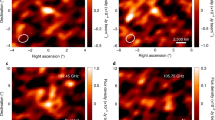Abstract
MANY comets have developed in an extremely irregular and unexpected manner. Large changes of intrinsic brightness have occurred quite suddenly, and curious and rapid changes of shape associated with the coma have often been observed, sometimes with disruption and complete disappearance of the comet. The standard empirical law of brightness is L=Loδ−2 r−n where δ and r denote distance from the Earth and Sun respectively ; the index n ranges1 from about −1.8 to +11.4, with an average value of about 3.3. Although the absolute brightness of most comets increases with diminishing solar distance, the negative values of n arise from a small number that have grown fainter as they approached the Sun.
This is a preview of subscription content, access via your institution
Access options
Subscribe to this journal
Receive 51 print issues and online access
$199.00 per year
only $3.90 per issue
Buy this article
- Purchase on Springer Link
- Instant access to full article PDF
Prices may be subject to local taxes which are calculated during checkout
Similar content being viewed by others
References
Baldet, F., Trans. Int. astr. Un., 155 (1948).
Marsden, B. G., IAU Circ., No 2541 (June 6, 1973).
Lyttleton, R. A., The Comets and their Origin (Cambridge Univ. Press, 1953).
Author information
Authors and Affiliations
Rights and permissions
About this article
Cite this article
LYTTLETON, R. Prospects for Comet Kohoutek (1973f). Nature 245, 200–201 (1973). https://doi.org/10.1038/245200a0
Received:
Issue Date:
DOI: https://doi.org/10.1038/245200a0
Comments
By submitting a comment you agree to abide by our Terms and Community Guidelines. If you find something abusive or that does not comply with our terms or guidelines please flag it as inappropriate.



